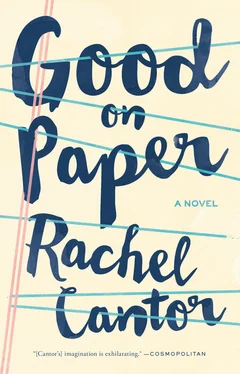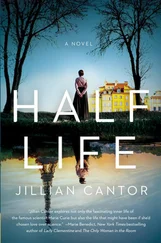Andi was starting school in a week, so she and I were at her closet going through her clothes. When my phone rang, she ran to my room, wearing only her tights, Mary Janes, and day-of-the-week underwear. To retrieve my phone, I thought; in fact, to answer it.
Hello, she said, before I could take the phone from her. She must have thought it was Ahmad. I shook my head. No! She listened a moment, then handed me the phone, disappointed.
Who is this? Romei asked.
Hello? I said. It’s Shira.
Who is this child who answer the phone?
My daughter, I said.
Not that it’s any of your business , I thought.
You have a daughter? I know nothing about a daughter. How old is this daughter? What is this daughter name?
Andrea, she’s seven, almost eight.
Silence.
The name of your husband?
I am happily single, I said.
Silence.
She is healthy, this Andrea? (He pronounced it in the Italian style: Ahn- drey -ah.)
Very.
Long silence.
I may speak to her?
Weirdo .
I looked at her, my sweet, beautiful thing with her straggly braids and impatient expression.
Mo-om , she said. I’m tired! It’s time for bed!
It was an hour before Andi’s bedtime. I put up a finger — one moment.
Maybe some day she tell her friends she talk to Nobel laureate.
Make it quick, I said.
Andi accepted the phone with a quizzical look.
Who is this? she said.
I tried to move my ear toward the phone, but Andi turned away and started nodding seriously, as if Romei could see her. Okay, she said finally and handed me the phone.
What did you say to her? I asked.
Andi put her hands on her hips.
Mo-om! she said.
She is very intelligent, this Andrey-a.
I wasn’t sure if this was a statement or a question. I assumed the former, though she hadn’t said a word. Maybe when dealing with Romei this was a sign of intelligence.
Of course, I said, and looked at her proudly. Very intelligent.
She rolled her eyes again, and plopped onto the bed with a humph .
So you may tell me about Vita Nuova , please.
Vita Nuova ? What do you want to know? and gave Andi a look that said, Patience, my precious .
Whatever seem relevant, he said.
Deep breath. Was he testing me? Would I really have to sing for my supper?
Vita Nuova …, I said. I’d discoursed on the topic just a few days before, but now, talking with the Great Man, my mind was a blank.
College fund, braces, Barbie Dream Palace .
Vita Nuova poses a number of problems for the conscientious translator …
Bah! Romei said. I am caring nothing for this! What is making you feel, this book?
Andi was holding a dress up to her front, a frilly one she knew I hated.
Feel? I asked stupidly. I don’t feel anything when I translate.
This I think is not true. I think you are not liking this work.
Devil!
I like it okay.
Miss Greene, if we are to work together we must be making one agreement.
Yes?
Andi was swirling pirouettes, dancing with her frilly dress. I smiled.
Just one minute , I whispered to her.
Full disclosure!
Full disclosure?
Yes! Full disclosure. You don’t like this libello , is okay! We are friends now, you tell me.
I don’t know …
You do not like. I know this.
Okay. You’re right: I don’t like Vita Nuova . Dante says his book is about love, but as far as I’m concerned, he knows nothing about love! He never gets close to Beatrice! He stares at her, he worships her, when he’s very lucky, she says hello. He’s in love with an idea, not a person! Love is something he experiences only in his imagination.
You think love is not something we experience in the imagination?
You know what it reminds me of? I said, ignoring his question. It reminds me of poets who translate other poets, not because they’re interested in the original, but because they want to turn it into something that looks like them . Dante says his world revolves around Beatrice, but in fact, it revolves around him — his longing, his words, his precious emotions. You can’t be faithful if you think only of yourself.
You think fidelity is possible? he asked.
In a translator or a man? I said before I realized what I was saying.
Either, he replied. Both.
Andi was making a show now of picking up her good school dresses one by one with two fingers and letting them drop, like smelly garbage, into the give-away pile.
I shook my head at her and crossed the living room to the study.
You mean absolute fidelity? I asked, as I sat on the loveseat. Pure translation, pure unwavering love? Of course not. There’s always a rupture, always an abandonment. The translated one is always betrayed.
Yes, he said. I am reading this essay — how you put it — of the traduttore/traditore .
I blushed. He was referring to the essay, published when I quit grad school, in which I railed about the impossibility of translation, the age-old notion that she who translates is both translator and traitor. I waited for the obvious: If you hate Dante and you don’t believe in translation, why did I hire you? Instead, he said, And why you think he do this, Miss Greene?
This?
Why you think he not get close to Beatrice?
Is it important?
To me, yes it is.
I think he cares more about his Beatrice poems than he does about Beatrice. He cares about art, not love. Vita Nuova is not a romance, it’s a manifesto explaining Dante’s shift from lyric to narrative .
I think is not this. He not get close to Beatrice because he is fearful, as you say. Of rupture, abandonment, betrayal. Is simple.
Maybe, I said, though I’d never found psychological analysis all that compelling. And thought: Fancy words for a guy who speaks only pizza-man English .
And the new life, Miss Greene? What are you thinking? What is this?
Andi had arrived in the study and was doing jumping jacks in front of the loveseat.
The new life? I asked, trying not to laugh. Grad students everywhere, footnote on the apex of the ridge of the postmodernist canon .
Yes, what are you thinking?
It’s not clear what Dante means by new life , is it? I said. As you know, the Italian words vita nuova don’t appear anywhere in the text, just the Latin vita nova . You remember the first lines: “In that part of the book of my memory before which little can be read, one finds a heading that says, Incipit vita nova . Under that heading I find written the words that I intend to transcribe in this little book — if not all, then at least those that are significant.”
I recited the lines in Italian, to show him I could.
Some say this new life refers to a sexual or moral awakening in boyhood. Others say it refers to a shift of poetics occurring in mid-life.
Yes, Miss Greene, he said impatiently, but what is your feeling?
My feeling? I asked.
This is what I am asking.
I think we have to credit Dante with his new life precisely when the text announces it, which is to say, when he first encounters Beatrice. But a new life at eight and three-quarters can hardly be new to an author of thirty. Or can it? Can a “new” life span an entire lifetime? What kind of “new life” is that? The new life, we realize, coincides with the onset of memory. Before it, little can be recalled; after, much is remembered. Memory equals awareness of self in time — self plunged into narrative, if you will, self become both object and observing subject. For Dante, then, the new life is nothing less than the life of consciousness — activated by love, empowered by imagination, moderated by reason. Understood this way, a new life experienced in childhood can still be new at mid-life.
Читать дальше












